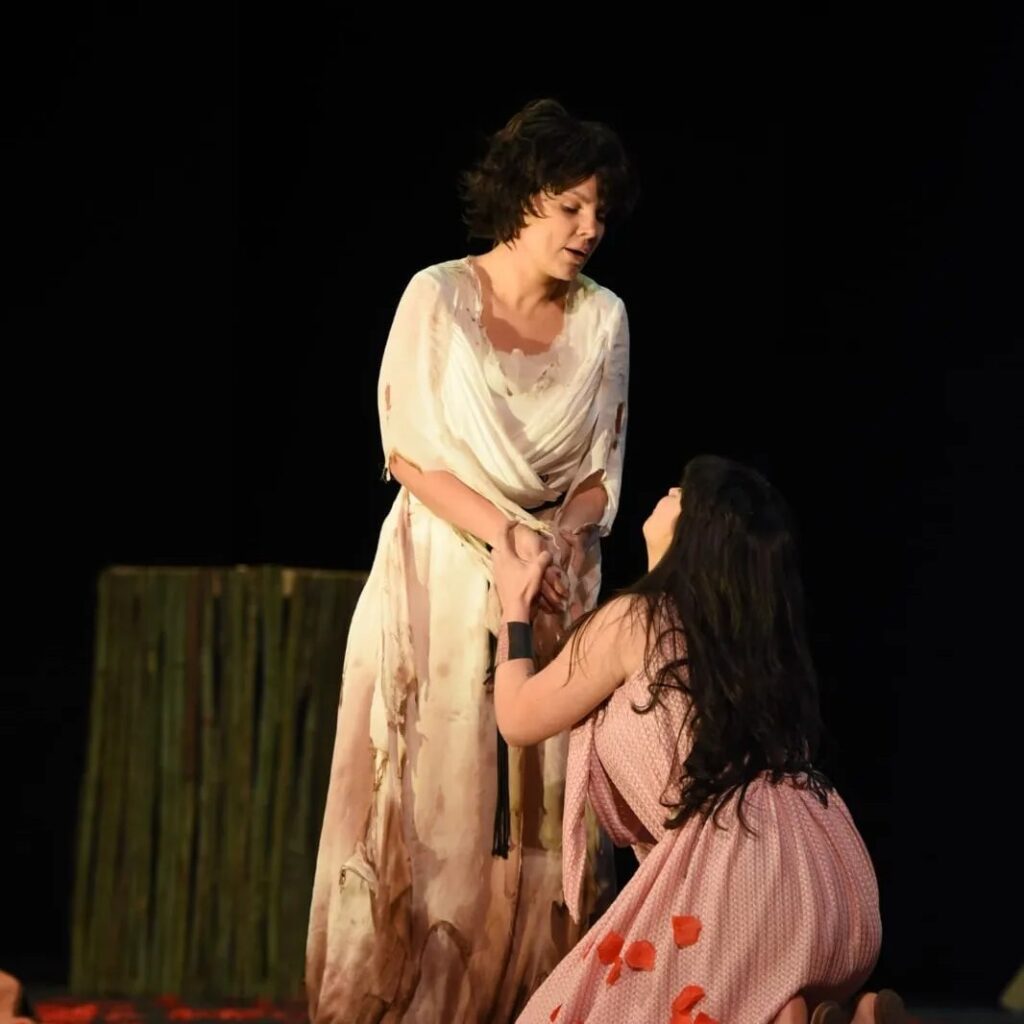Teatri Kombetar Eksperimental “Kujtim Spahivogli”, Tirana
“I will not live by rules like those!” Electra’s cry echoed through the hall. Kiço Londo’s production of Sophocles’ tragedy demonstrates his commitment to theatre. It takes courage to stage a challenging play like this with only the resources of a small theatre company, in this case with ‘Teatri Shëtitës Çajupi’, performing at Teatri Kombetar Eksperimental “Kujtim Spahivogli”.
Many of the performances are very strong. In the role of Electra, Laura Nezha has been given a dream role for every actress. She appears transformed from her pervious roles, both on a physical and emotional level. It’s a very commanding performance, her mental and emotional exhaustion are palpable. Alongside her Gladiola Harizaj plays Clytemnestra, Electra’s mother, with an air of grandiosity and selfishness, a woman full of malice, something which is apparent in her rivalry with her daughter.
Sophocles’ play explores the hatred that Electra harbours towards her mother after she kills her husband Agamemnon and goes to live with her lover and fellow murderer Aegisthus (Gert Ferra). Nezha and Harizaj successfully create two poles, two extremes, in their darkly believable rivalry. Alert Çeloaliaj also gives an interesting performance as The Man, playing the role in a very dignified manner, ready to stir the waters throughout the show.

Electra
Londo directs with an emphasis on textual faithfulness. As a result, in many moments during the production it felt as if the themes of patriarchy and sacrifice proposed by the play needed to be further developed so that they might speak to the present moment in a more effective way. For instance, at no point in the play was the guilt of King Agamemnon – man who sacrificed his daughter Iphigenia for the sake of war – ever questioned or even explored; throughout, he was only ever portrayed as a victim of his wife and her lover, even when Clytemnestra cried out her pain over what he did to her daughter. This normalization of the sacrifice of a girl by a man, and the subsequent public trial of a woman who betrays him, may reflect society in 5th century B.C.E) but in today’s society, especially in Albanian culture with its patriarchal tendencies, it is not enough to simply present these things – there needs to be directorial intervention.
The plot that Electra and her brother Orestes (Engjëll Hoxha) make to kill their mother and Aegisthus was, once again, not very well developed: both murders occur very quickly towards the end of the play, the murder scenes were almost unbelievable, and, furthermore more, the rapport between Nezha and Hoxha came to feel (unintentionally) almost incestuous, a consequence of the over idealization of their sister-brother bond. Nor did the director explore the idea of the Electra complex, Freud and Jung’s theory of psychosexual conflict between a mother and daughter. By shedding more light on these dark recesses of human relationships, it could to some extent justify Electra’s approach to her father as a hero even though he had killed her sister and someone no less murderous than Clytemnestra.
The scenography was minimalist, with red rose petals scattered everywhere symbolizing blood. This gives more space to the dialogue and to the complex events of the play. The flowing costumes add colours, as does the presence of the choir (Medi Gurra, Greta Baci, Asiana Koka, Melisa Manuka, Suela Prendi). They support Electra in her pain and lead her towards forgiveness in a way that helps to make the show more dramatic, even though the behaviour and interaction of choir with Electra on stage could have been used better. Sometimes it seemed as if they violated the intimacy of the relationships, especially in this work where the relationship with oneself and with others is treated at a subconscious level and every act of the main characters seems to be drawn directly from the Id.
This is not the first time Electra has been presented on the Albanian stage, but there remains unabated audience interest for such productions. The reworking of these classic texts on stage always ignites debate in the audience and between artists. Here Laura Nezha successfully performs this complex protagonist in a way that rewards analysis. In her hands the show sometimes seems like a long, elegiac lament.








